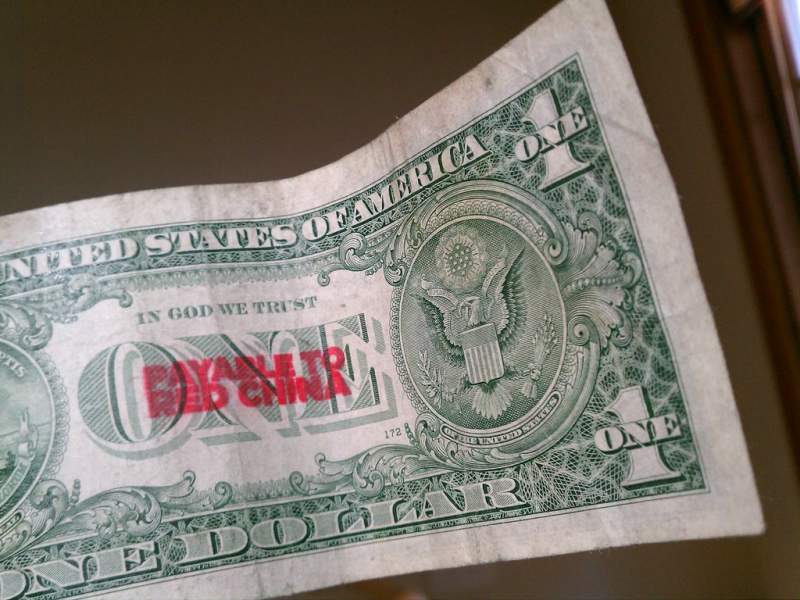China - Dark Money
Monday, October 2, 2023
Written by Laurence F Sanford, Senior Analyst ASCF
Categories: ASCF News ASCF Articles

China - Dark Money
Dark money from China is subverting America. The Chinese Communist Party (CCP) is funneling billions of dollars to capture and influence elite political, economic, educational, and media leaders throughout the world.
“China Said To Invest Billions to Mislead The World” is the headline in a Wall Street Journal article dated September 29, 2023. The U.S. State Department’s Global Engagement Center said, “Beijing has invested billions of dollars to construct an information ecosystem in which PRC (People’s Republic of China) propaganda and disinformation gain traction and become dominant.
Money talks, and Chinese money is talking loudly. Dark money is defined as influencing political outcomes where the source of the money is not disclosed. The most common type of dark money sourcing in the U.S. is the 501(c)(4) non-profit organization, which can receive unlimited donations from individuals and organizations without public disclosure. The monies collected can then be spent on “issue advocacy” versus “electioneering issues” and thus be exempt from federal election finance laws. “Issues” fall under First Amendment protections.
In 2018, Joe Biden co-authored an article in Politico titled “Foreign Dark Money is Threatening American Democracy.” He wrote that “when it comes to foreign dark money, we remain woefully unprepared.” The Treasury Department reported that in 2015, $300 billion was laundered through the U.S. The amount of CCP monies flowing directly to 501(c)(4) non-profits is unknown to the public.
In the 2020 election cycle, more than $1 billion was spent in dark, undisclosed money. Of that amount, $514 million was spent to help Democrats, and $200 million was spent to help Republicans. Joe Biden received $174 million in anonymous contributions, over six times as much as Donald Trump’s $25 million. The Sixteen Thirty Fund, an affiliate of liberal donor-advised fund Arabella Advisors, spent $410 million in 2020 (more than the Democratic National Committee itself), primarily focused on helping Democrats defeat President Donald Trump and win back control of the United States Senate.
The Chinese embassy in Washington, D.C., actively lobbies against Congressional bills that enhance American competitiveness against China. The Chinese threaten American companies that they will lose market share and revenue if the bills pass. Chinese foreign ministry spokesperson Zhao Lijian said the bills distorted facts and were based on “Cold War thinking.” Zhao left unsaid that the CCP has been conducting unrestricted warfare against the United States since the 1949 founding of the PRC.
Summary
The CCP is spending billions of dollars to subvert and weaken the U.S. externally and internally.
The CCP is gaining global influence with its Belt and Road Initiative (BRI) of bribing foreign elites and funding major infrastructure projects. The terms of the BRI loans are opaque and onerous. Poor countries later find many of the projects uneconomic, poorly constructed, and with interest payments that bankrupt the country. Meanwhile, the elites are basking in Swiss bank account monies.
The U.S. State Department accused China of using “deceptive and coercive methods” to shape the global information environment by acquiring stakes in foreign print, media, and television networks. The same strategy is being used to gain control of port facilities worldwide, the most prominent example being the control of Panama Canal ports.
In the U.S., the CCP is funding, donating, and buying elites in universities, media, Wall Street, and Washington, D.C. Recently, CCP hackers accessed over 60,000 emails from State Department files. The campaign against the U.S. is all-encompassing, with the fusion of all Chinese organizations and individuals working together to achieve world domination.
Action
1. Recognize the CCP is no friend of the U.S. or democracy. The CCP is a totalitarian Marxist dictatorship that rules China with the goal of world domination. Aiding and abetting the CCP has not opened up China to democracy. If anything, economic prosperity aided by intellectual and property theft of American know-how has strengthened the state security apparatus.
2. The U.S. should have as its foreign policy “we win, they lose.” We should implement and enlarge gray zone activities to encourage the Chinese people to rid China of the CCP Marxist terror organization. Marxism is, after all, a European ideology. Gray zone activities to include:
a. Call out CCP atrocities - genocide in Xinjiang; persecution of Christians, Muslims, and Fulan Gong; and organ transplants.
b. Support countries bordering the East and South China Seas against CCP territorial seizure.
c. Invest in a propaganda infrastructure that educates the world on CCP perfidy.
3. Reciprocity - If the CCP doesn’t allow Americans to operate in China, then America should not allow the Communist Chinese Party to operate in America. Thus, no CCP media (TikTok) or sales of land, high-tech equipment, or electric vehicles (EVs) in the U.S.
4. Decouple the U.S. economy from China. Stop subsidizing CCP solar, wind, and EV technologies. Support American carbon-based industries and nuclear energy.
5. Invest in the military and intelligence agencies. Purge the organizations of Marxist grievance programs, which do nothing but increase divisiveness and weaken cohesion.
Peace Through Strength!
Laurence F. Sanford
Senior Analyst
American Security Council Foundation
www.ascf.us




